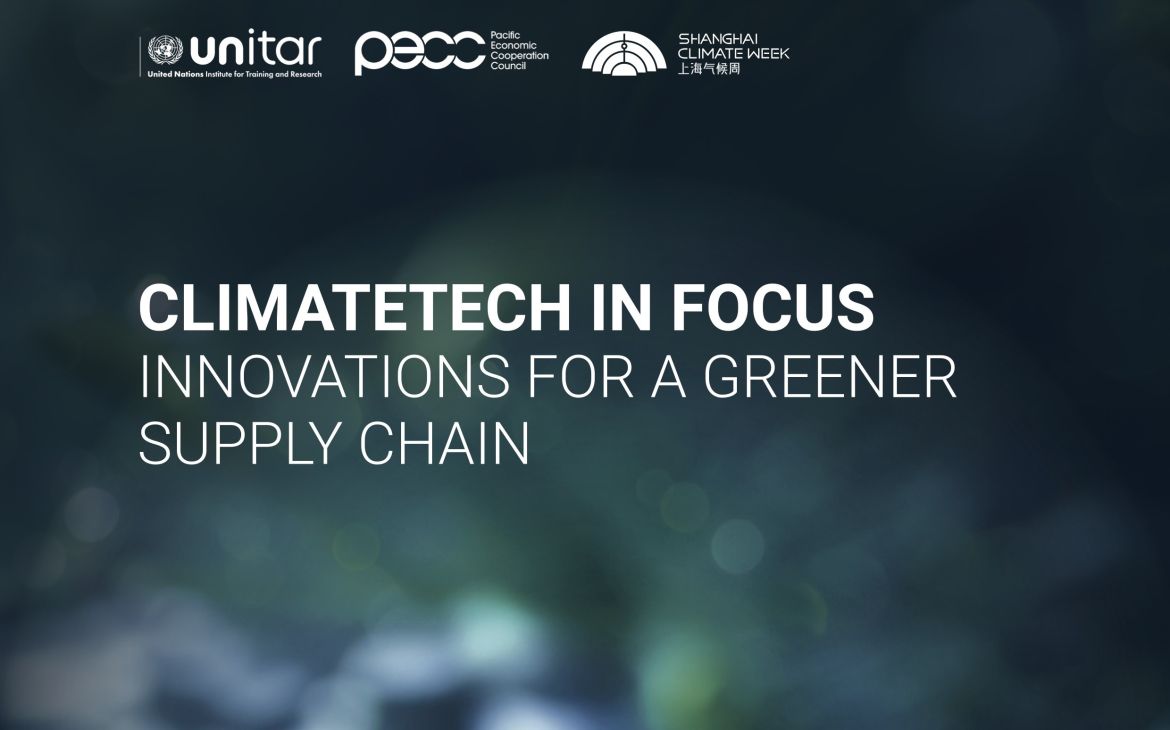Overview
Our report ClimateTech In Focus: Innovations For a Greener Supply Chain, published jointly with the Pacific Economic Cooperation Council (PECC) and Shanghai Climate Week, spotlights the pivotal role of ClimateTech in revolutionizing global supply chains towards environmental responsibility and efficiency. This report outlines the essential drivers of climate action—awareness, government goals, and economic incentives—and stresses the urgency of moving beyond compliance to achieve excellence in sustainability. The report advocates for a regulatory framework supported by robust enforcement and education to catalyze tangible climate actions, especially in developing nations balancing environmental and developmental goals.
The report identifies key areas where ClimateTech can lead to significant emission reductions by focusing on traceability, hard-to-abate sectors, and other imminent issues. It also underscores the importance of innovative finance models in bridging the gap between concept and market-ready solutions.
The report calls for a global joint effort involving investors, innovators, educational institutions, and enterprises to harness ClimateTech's full potential and ensure a sustainable and thriving future.
This report examines the state of ClimateTech innovation in greening global supply chains and its potential for sustainable development as follows:
- Section 1: Background
Explores the origins and development of sustainable supply chain concepts and the role of technology in enhancing supply chain sustainability.
- Section 2: ClimateTech Market Landscape
Assesses the current state and growth potential of the ClimateTech market, identifying key segments and areas poised for expansion.
- Section 3: Focus Area Deep-dive
Analyzes the progress and potential of four critical ClimateTech areas: AI in supply chain management, traditional energy decarbonization, hard-to-abate manufacturing, and clean energy in logistics.
- Section 4: Powering the Progress: Finance, Education, and Infrastructure
Examines the enablers of green supply chain transformation, including the roles of finance, education, and infrastructure in fostering innovation and scalability.
- Section 5: Conclusions
Summarizes the report's key findings, emphasizing the need for global collaboration to harness the full potential of ClimateTech and drive sustainable practices forward.
Join us in exploring these insights and the path to a greener global supply chain.
From Unitar
“The supply chain is a critical nexus where climate change, market forces, technology, and economic interests converge. In line with the mission of the United Nations, we are committed to exploring how climate technology can unlock new leadership opportunities and generate meaningful employment.” - Nikhil Seth, United Nations Assistant Secretary-General & Executive Director of the United Nations Institute for Training and Research
From Authors
“I firmly believe that through our collective efforts, ClimateTech will become a highlight of human wisdom and technological innovation, serving as a new engine for economic growth and sustainable development.” - William Wang, Chief Representative for Asia Pacific of Shanghai Climate Week & Director-General of Shanghai Climate Week Youth Council
“ClimateTech is not a fleeting trend confined to laboratories; it stands as one of the most promising avenues for humanity to tackle climate change and drive sustainable progress.” - Antonio Basilio, Chairman of the Pacific Economic Cooperation Council Philippine National Committee & Director of APEC Business Advisory Council
Partner Institutions
Pacific Economic Cooperation Council (PECC) is an independent, regional mechanism with 23 member countries and 2 institutional members that advances economic cooperation and market-driven integration. It has served as a regional forum for cooperation and policy coordination to promote economic development in the Asia-Pacific region since 1980. As APEC's only non-government official observer, PECC provides information and analytical support to APEC ministerial meetings and working groups in facilitating private sector participation in the formal process.
Website: https://www.pecc.org
Shanghai Climate Week (SHCW) is a global non-profit platform for governments, businesses, academic institutes, and social institutions to communicate & collaborate on climate actions under the support of the UN & Chinese governments. It aims at “China Action, Asia Voice, Global Standard,” pushing social forces of engagement in China’s commitment to carbon peaking and neutering goals, amplifying Asia’s voice for green transformation, enhancing international communication & collaboration in response to climate change, and participating in design & implementation of international standards.
Website: www.shanghaiclimateweek.org.cn



